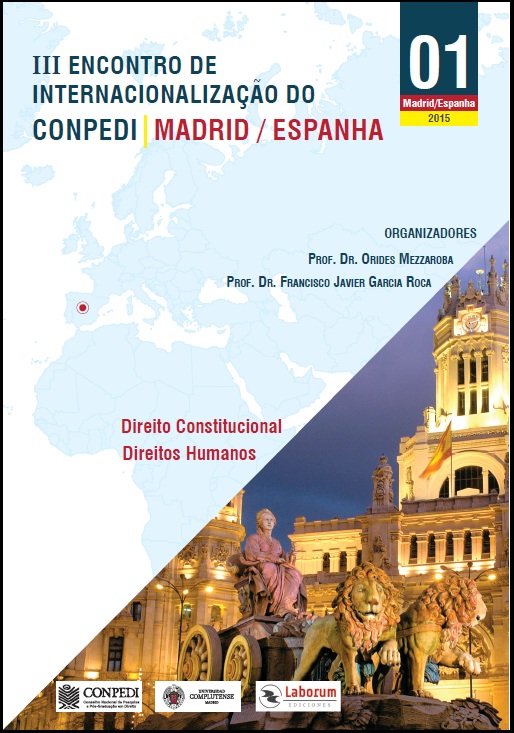Constitutionalism (s ) and reframing Hermeneutics : Reflections from the Critical Perspective Latin American
Main Article Content
Abstract
At the end of XX century, news and diffuse law speeches will pointing the emergence of innovative theoretical models self-proclaimed “critical”. In Brazil, in this context, is inaugurated an innovative and revolutionary face of constitutionalism which expands the power of the judiciary, for the preservation of democratic order and fundamental rights. On this track changes a new feature is the extensive social rights catalog that redefines the hermeneutic field, hitherto of modern formal legalistic tradition. However, the desire to consolidate and ensure both institutional and cultural fundamental rights, is being wit- nessing the first decade of XX century in Brazil as well as in some Latin American coun- tries, expanding the field of democratization and social policies. In this context, while it is being implemented a new constitutional paradigm from plurinationality, demodiversity and new rights linked to rationality, there is the expansion of the role of the judiciary which ultimately provoque a distortion of jurisdiction and hermeneutic fundamentals that serves as its legitimacy. It is from this unprecedented complexity that since Mark of the tradition of critical thinking, the juridical thinkers are forced to rethink hermeneutics from a new logic, new foundations and new epistemological elements, shifting the her- meneutical question to a different dimension than have been given by modern rationality and beyond what was bequeathed to the positivist tradition: the external field of norma- tive valuation. Challenge between oscillations and divergences can not be overlooked.
Downloads
Article Details
Autores que publicam nesta revista concordam com os seguintes termos:
O(s) autor(es) autoriza(m) a publicação do texto na da revista;
O(s) autor(es) garantem que a contribuição é original e inédita e que não está em processo de avaliação em outra(s) revista(s);
A revista não se responsabiliza pelas opiniões, idéias e conceitos emitidos nos textos, por serem de inteira responsabilidade de seu(s) autor(es);
É reservado aos editores o direito de proceder a ajustes textuais e de adequação às normas da publicação.
Autores mantém os direitos autorais e concedem à revista o direito de primeira publicação, com o trabalho simultaneamente licenciado sob a Licença Creative Commons Attribution que permite o compartilhamento do trabalho com reconhecimento da autoria e publicação inicial nesta revista.
Autores têm autorização para assumir contratos adicionais separadamente, para distribuição não-exclusiva da versão do trabalho publicada nesta revista (ex.: publicar em repositório institucional ou como capítulo de livro), com reconhecimento de autoria e publicação inicial nesta revista.
Autores têm permissão e são estimulados a publicar e distribuir seu trabalho online (ex.: em repositórios institucionais ou na sua página pessoal) a qualquer ponto antes ou durante o processo editorial, já que isso pode gerar alterações produtivas, bem como aumentar o impacto e a citação do trabalho publicado (Veja O Efeito do Acesso Livre) emhttp://opcit.eprints.org/oacitation-biblio.html
References
DORANTES, Arturo Guilhermo González, Hacia una interpretación analógico-icónica del hombre Coleção: Analogia Filosófica, nº 16, SIN 0188-896X; México D.F., 2005.
FERRAJOLI, Luigi. A democracia através dos direitos – o constitucionalismo garantista como modelo teórico e como projeto político. Tradução de Alexandrer Araújo de Souza e outros. São Paulo: Ed. RT, 2015.
GADAMER, Hans-Georg. Verdade e Método II – Complementos e Índice. Tradução de Enio Paulo Giachini. São Paulo: Vozes, 2004.
GARCÍA, Manuel Calvo. Los fundamentos del método jurídico: una revisión crítica. Madrid: Tecnos, 1994.
GRONDIN, Jean. Introdução à hermenêutica filosófica. Tradução de Benno Dischinger. São Leopoldo: Ed. Unisinos, 1999.
MÉDICI, Alejandro. La constitucionalización horizontal – teoria constitucional y giro decolonial. San Luis de Potosí: Universidad Autónoma de San Luis Potosí, 2012.
SARMENTO, Daniel. Por um constitucionalismo inclusivo: história constitucional brasileira, teoria da constituição e direitos fundamentais. Rio de Janeiro: Lumen Juris, 2010.
STRECK, Lenio L. Hermenêutica Jurídica e(m) Crise – uma exploração hermenêutica da construção do Direito. 10ª Ed., Porto Alegre: Livraria do Advogado, 2011.
WOLKMER, Antonio Carlos. Introdução ao Pensamento Jurídico Crítico. 8ª ed. São Paulo: Saraiva, 2012
______. Pluralismo Jurídico – fundamento de uma nova cultura no Direito. São Paulo: Editora Alfa Omega, 1994.
ZIZEK, Slavoj. Em defesa das causas perdidas. Tradução de Maria Beatriz de Medina. São Paulo: Bointempo, 2012.





